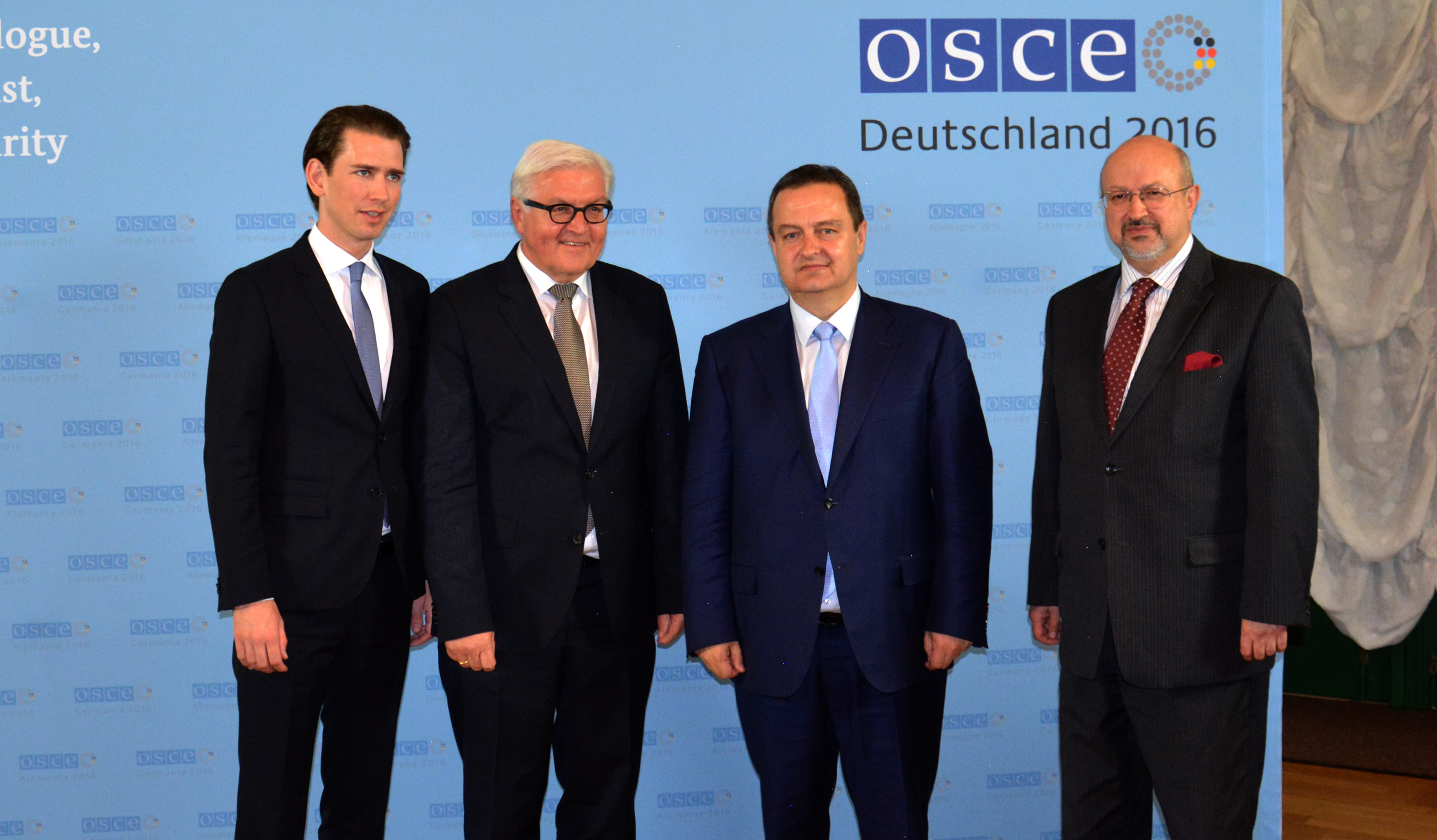



| Wednesday, 13 April 2016. | |
| Joint statement of the OSCE Troika | |
| + larger fontnormal font- Smaller font |
 The OSCE Chairperson-in-Office and German Foreign Minister Frank-Walter Steinmeier welcomed Serbia's and Austria's Foreign Ministers Ivica Dačić and Sebastian Kurz as well as the OSCE Secretary General Lamberto Zannier for an OSCE Troika meeting in Berlin today. The OSCE Chairperson-in-Office and German Foreign Minister Frank-Walter Steinmeier welcomed Serbia's and Austria's Foreign Ministers Ivica Dačić and Sebastian Kurz as well as the OSCE Secretary General Lamberto Zannier for an OSCE Troika meeting in Berlin today.The members of the OSCE Troika discussed recent developments in the OSCE region, including the situation in Ukraine and the Nagorno-Karabakh conflict zone. They also focused on issues of migration, the fight against terrorism and economic connectivity. They underlined the important role the OSCE is playing as a regional security organization and stressed the need to provide it with sufficient operational capacities and financial resources to address the challenges to European security. The members of the OSCE Troika expressed strong concern over reports on increasing numbers of ceasefire violations and the presence of heavy weapons in the security zone in the east of Ukraine. They underlined that renewed hostilities and the return of proscribed weapons as reported by the Special Monitoring Mission to Ukraine (SMM) are in breach of the Package of Measures for the implementation of the Minsk agreements and called on all signatories of the Minsk agreements to honour their commitments. The Ministers and Secretary General Zannier called upon the sides to fully ensure safety and free and unrestricted access of the OSCE monitors throughout the area of conflict, including to the Ukrainian-Russian State border in accordance with the SMM-mandate and the Minsk agreements. They underlined that incidents against SMM monitors, as reported by the Mission in recent days, are unacceptable and that those responsible for threatening and using force against civilian monitors must be held accountable.They assured the SMM and its Chief Monitor, Ambassador Apakan, as well as the Special Representative of the CiO, Ambassador Sajdik, of their full support. In reaction to the recent escalation in the Nagorno Karabakh conflict, the members of the OSCE Troika urged the sides to end all violence, to strictly adhere to the ceasefire, and underlined that there can be no military solution to the conflict. They agreed that de-escalation and stepping up the political process are paramount. They welcomed the joint statement issued by the Minsk Group on April 5 and underlined their continuous support for the efforts of the Group and its Co-Chairs. They will continue to follow developments on the ground closely and to promote the political process. Condemning the terror in attacks in Ankara, Brussels, Istanbul, Paris and elsewhere, the Troika stressed the important role the OSCE can play in combatting terrorism and violent extremism. Chairperson-in Office Steinmeier underlined that "The OSCE is a unique platform for dialogue and co-operation, also and in particular for finding common responses to security threats that no state can counter effectively alone. The German Chairmanship will make every effort in this respect, in particular by hosting a conference focusing explicitly on the phenomenon of Foreign Terrorist Fighters in May." The Troika welcomed efforts undertaken by Austria to put special emphasis on the fight against radicalization and extremism as Chair of the OSCE Mediterranean Partnership. The Troika also underlined their view that the OSCE – thanks in particular to its large geographical scope and its comprehensive security concept – can and will contribute towards addressing challenges stemming from the current migration crisis. The Austrian Foreign Minister Sebastian Kurz stressed in this regard: "The unprecedented flow of refugees and migrants heading for Europe since last summer demonstrates clearly the need for enhanced co-operation at all levels. I therefore fully support the Chairmanship's initiative to consolidate and refocus the OSCE´s assistance to participating States in sustainably addressing this challenge. As current chair of the Mediterranean Partnership of the OSCE, Austria will also ensure that OSCE Partners will be closely associated to these efforts." Serbian Foreign Minister Ivica Dačić added: "As OSCE Chairmanship last year, Serbia has initiated discussions on how to enhance an OSCE-wide response to the migration crisis. We believe that finding a systematic and comprehensive solution in cooperation with other relevant international organizations is the only way to deal efficiently with a crisis of this scale. We welcome the continuation of these efforts and commitment of the current and incoming Chairmanships." In this regard, Ministers also welcomed the activities undertaken by the Secretary General and in particular the recent "Security Days: Refocusing Migration and Security - Bridging National and Regional Responses" in Rome on 4 March. The Troika also discussed further initiatives of the OSCE Chairmanship to address current security challenges and to provide opportunities for increased dialogue throughout the OSCE area. Steinmeier concluded: "The current fragile security situation in Europe calls for more dialogue on political level within the OSCE area. I have therefore decided to convene an informal meeting of OSCE Foreign Ministers on 1 September 2016 in Potsdam, to provide space for a broad and deeper political discussion of security challenges facing our region." Troika partners welcomed this initiative of the Chairmanship and expressed their full support for its intention to strengthen dialogue on the political level in the OSCE area. The Ministers also stressed the important role of the OSCE Troika in supporting the Chairmanship and in ensuring the continuity of the OSCE's work. |